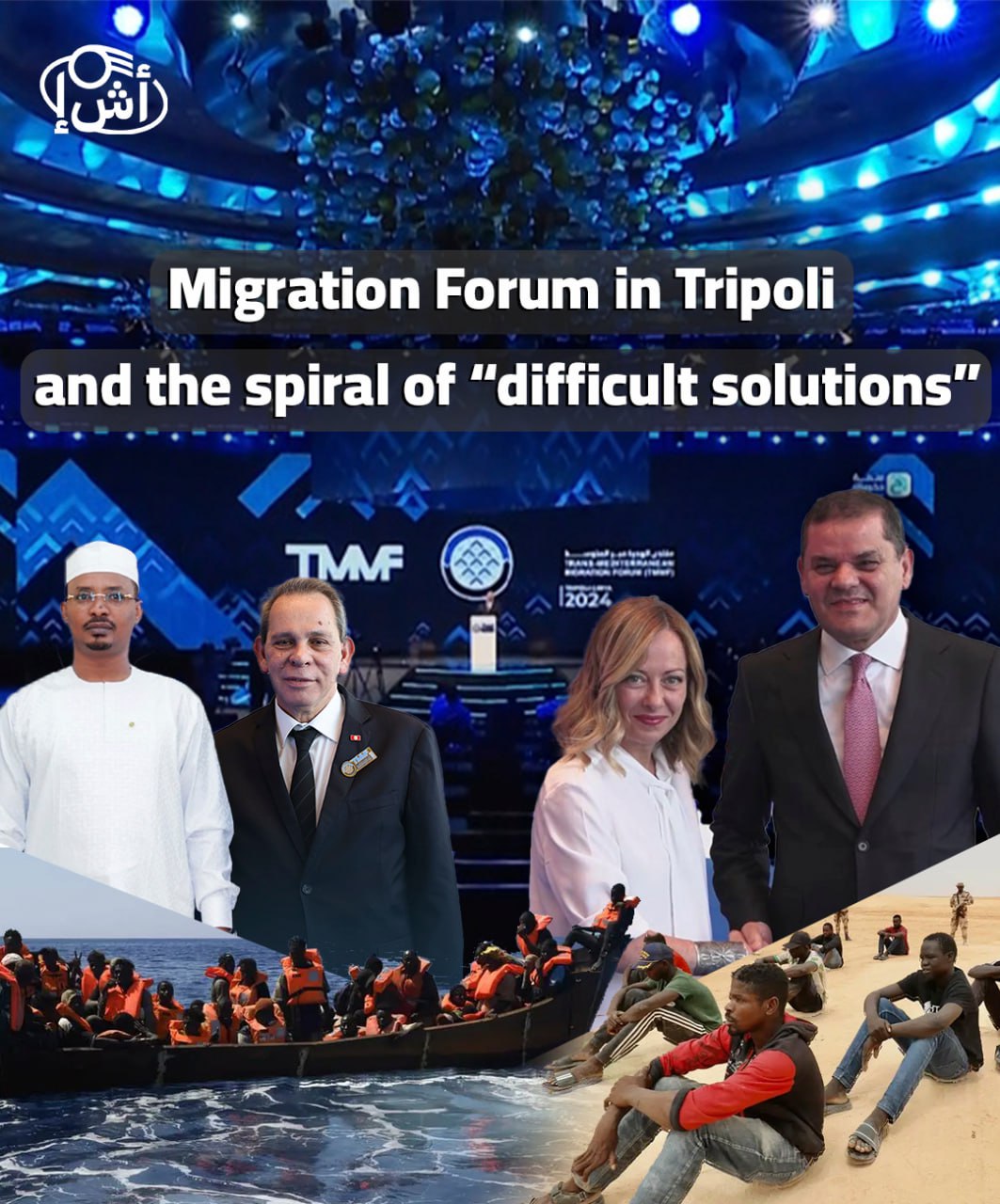The “Trans-Mediterranean Migration” forum, hosted by Tripoli, presented a panorama of all the positions of the countries participating in it on the issue of migration, and ended without any action to reduce this phenomenon, which represents a security, economic and humanitarian challenge.
The forum, which was held on July 17, 2024, dealt with the migration issue independently of the severe political crises that cause this phenomenon. The wide participation in it conveyed an image of the complexity of this crisis and the challenges facing countries and international organizations in dealing with migrants. However, the forum was technical and clearly moved away from The reality of wars and unrest that cause the phenomenon of migration, and remained within the framework of addressing the consequences of migration on countries that absorb a large number of migrants, especially Libya.
The reality of migration in Libya
The Libyan Minister of the Interior in the outgoing Government of National Accord, Imad Trabelsi, presented a bleak picture of the reality of illegal immigration. The number of immigrants in Libya exceeded 3 million people, according to Trabelsi, and between 90 and 120 thousand immigrants enter Libyan territory every month through the desert, as a result of the war in Sudan. And the unrest in Chad and in the Sahel countries as well; There are huge concentrations of migrants inside Libyan territory, causing great security, economic and social pressure on the Libyan government and its infrastructure.

This reality makes Libya a meeting point, and also makes it, according to Trabelsi, the first line of defense against the influx of migrants to Europe. This signal from the Libyan minister carries with it the distribution of responsibility for migration to all countries. According to his statements, Libya is committed to its agreements with Italy and Malta to ensure border security, but the density The humanity of migrants in detention centers and the insufficient resources to meet their basic needs pose a real challenge to the Libyan government, as 760,000 migrants have entered Libya since the beginning of this year, and only 6,000 have been deported.
Libya’s demands and the role of the international community
Libya needs practical solutions to confront the reality of migration, especially since the issue of humanitarian aid to the migrants in the centers is insufficient. European support did not exceed 30 million euros, while Libya spent about 350 million dollars on this issue last year, and this could be possible if planes were secured to deport the migrants. To their countries, instead of just providing limited financial aid, it could constitute a more dynamic solution, as the wide southern Libyan borders do not provide control overflows, and the flow of migrants is not limited to conflict areas such as Sudan, as the Sudanese-Libyan-Chadian borders have become a meeting point for migrants from various parts of the continent. This is due to the spread of smuggling and human trafficking networks.

This complex reality prompted the Libyan government to call during the forum for strengthening security cooperation with neighboring countries and European Union countries to address the phenomenon of irregular migration, and to strengthen the voluntary return program for migrants, as Libya was able, through this program, to deport a number of them in cooperation with the International Organization for Migration, but Trabelsi pointed out that This number is insufficient, and Libya demands that planes be provided to transport migrants wishing to return to their homelands and provide the necessary support for health care, food, and clothing.

The Tripoli Forum also witnessed a welcome from the United Nations Support Mission in Libya, which called for a human rights-based approach to migration governance. The UN mission called for providing alternatives to detention and improving border management in a way that respects human rights, stressing the importance of international coordination in confronting migration challenges, according to the head of the Tripoli Forum. The outgoing government, Abdul Hamid Al-Dbeibeh, directed the money spent on managing migration flows towards financing development projects in the source countries. It would be better because spending on the immigration file over the past years did not solve the problem, and Al-Dibia considered that directing this money to the development of countries exporting immigrants would be more effective in reducing irregular migration.

International positions for collective cooperation
Italy, which is considered the closest point for migrants, was present at the forum through its Prime Minister, Giorgia Meloni, who stressed the need for collective cooperation to confront the challenge of irregular migration, stressing that the current approach must change at a 360-degree angle, and called for combating human trafficking and strengthening relations between countries. In the Mediterranean, the solution, according to Italian policy, lies in addressing the roots of the problem in the countries that are considered the source of illegal immigration.
Tunisia, which also suffers from illegal immigration and deals with it with limited resources, was present at the forum and demanded increased financial support from European countries. As for the UN mission in Libya, it stressed in a statement the importance of adopting a human rights approach in dealing with the immigration issue, calling for the protection of the rights of immigrants and refugees in Libya. Providing alternatives to detention, especially for children and victims of human trafficking.

The final statement of the forum remained far from the political concerns of African countries, as it pointed to the importance of implementing strategies that deal with the roots of the problem of irregular migration, but it placed development and human rights issues only among the solutions, without addressing Western policies that create crises and push Africans to migrate, and the security solutions remained. Also, at the forefront of what the participants put forward was the need to improve border management, strengthen rescue and relief mechanisms for immigrants, and provide the necessary support to countries receiving immigrants, while the political horizons that could make resolving the phenomenon of illegal immigration possible were absent.
Written by Mazen Bilal
Libya is second largest humanitarian aid donor to Gaza
